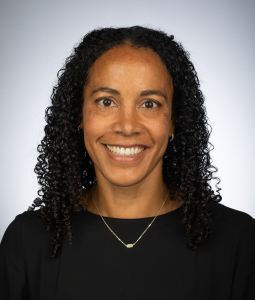 Preparing coaches to support girls in sports can help more young athletes stay in the game. Psychology Professor Jocelyn Carter is collaborating with Little League and the Center for Healing and Justice Through Sport to evaluate how coaches are trained. (iStock.com/monkeybusinessimages)
Preparing coaches to support girls in sports can help more young athletes stay in the game. Psychology Professor Jocelyn Carter is collaborating with Little League and the Center for Healing and Justice Through Sport to evaluate how coaches are trained. (iStock.com/monkeybusinessimages) Many girls who enjoyed trying to hit a home run or jumping into a soccer game might leave sports behind by the time they’re 12 years old. According to
Women in Sport, 43% of teenage girls who used to engage in sports stopped in their teenage years, compared to 24% of boys. A collaborative research project from Little League, the Center for Healing and Justice through Sport (CHJS) and DePaul University psychologist
Jocelyn Carter aims to find ways coaches can keep girls playing sports for longer.
The study focuses on intentional coach training that builds youth sports environments that are more supportive for girls and all youth.
CHJS will provide training to Little League coaches of girls ages 10 to 14, and Carter and her team will evaluate the effectiveness of the training and its impact on the girls’ experience this baseball and softball season.
“I love this work because it is a great collaboration with the Center for Healing and Justice through Sport who have become experts in training coaches,” Carter says. “I’m excited to combine our expertise to see how that training translates to coaching behaviors during the season and how it affects the kids’ experience.”
Building better training
Coaches will be trained based on the
CHJS Coaching Girls Guide, a document that compiles actionable steps for coaches based on previous research. The guide teaches coaches the skills needed to create a supportive environment that encourages long-term positive development in young girls.
 Jocelyn Carter (Jeff Carrion/DePaul University)
Jocelyn Carter (Jeff Carrion/DePaul University)
“A training itself is powerful because it allows coaches to focus on their skills and their philosophy as a coach. A lot of coaches are amazing, but they don’t necessarily get a lot of professional education in youth development,” says Lauren Kinderknecht, the operations and evaluation consultant at CHJS. “It’s helpful to give coaches time with other coaches to talk about challenges that arise and give them some of these tangible and actionable skills.”
Researchers will note various factors about the participants—whether they have coached before, their motivations for coaching or if their daughter is one of the kids they are coaching, for example—to see if it has any influence on the effectiveness of the training.
The study complements Little League and CHJS’s nationwide survey of parents and coaches that collects their perceptions of youth sports programs. Researchers will also talk to focus groups of girls on baseball and softball teams to understand their experience in the sport. The focus groups will be asked about why they play, their relationships with their teammates and how their coaches help them feel included.
“We don’t want girls, or anyone who hasn’t had access to sports, to stay in environments that are not good for them. We want to look at the environments they are in, examine how the kids are being treated and viewed there and figure out how they can be improved,” Carter says.
“Better coaching for everyone”
Sports can be beneficial to children for many reasons, including lower likelihoods of suffering mental health issues. However, not all children can access these benefits equally.
According to Carter, teasing related to physical appearance happens to young girls in any physical activity context, especially when their bodies begin changing in early adolescence. Some programs do not have the right equipment for girls to fully engage or give boys’ teams preferred time slots for practice.
Different sociocultural aspects may also influence a girl’s comfort with sports, such as concerns with sweating or their hair. Some girls may not have the time or resources to play sports as they get older because they may need to care for younger siblings or work instead. To ensure girls are getting the most out of sports, programs must consider these factors.
Experts agree that coaches can improve young players’ experiences by cultivating supportive mentorships, fostering healthy peer relationships and focusing on individual skill building over performance.
“Every kid, no matter what level they’re at, can improve their skills over time. Once they see themselves build competency in one area, that can translate to other areas in their life. That’s why we use the phrase ‘brave, not perfect,’ particularly with our girls, to help build a culture that isn’t afraid of mistakes,” Kinderknecht says.
This study provides a unique opportunity to deeply evaluate the effectiveness of coach training to best support coaches and the range of children that they teach. Research suggests that girls are more sensitive to poor coaching, but a supportive environment that rewards bravery and skill development is helpful for any child.
“Anyone who’s interested in coaching would benefit from this kind of training. Although this project is focused on keeping girls engaged, it leads to better coaching for everyone,” Carter says.
Jade Walker is a student assistant of media relations and communications in University Communications.